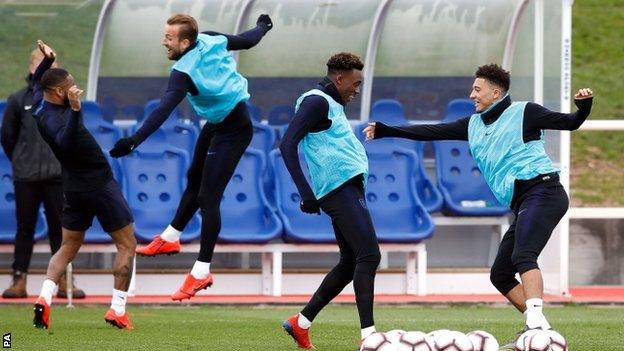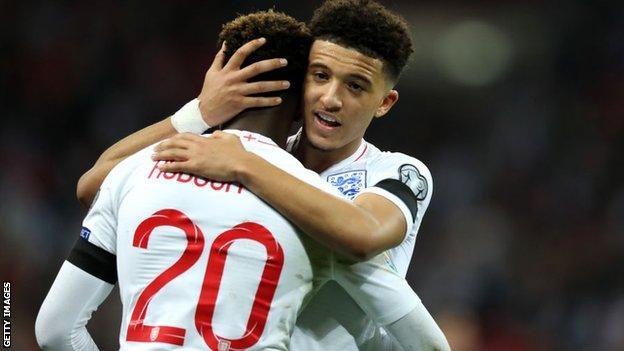What does a future England player look like? The changes bearing fruit for the Three Lions
- Published
- comments

Callum Hudson-Odoi and Jadon Sancho - team-mates in the Under-17 World Cup-winning side - are part of a new breed of England player
Before he left the Football Association in January, former technical director Dan Ashworth said no association had a better set of results across all its male and female teams over the past two years.
The big prizes for the senior teams eluded England, but reaching the last four of the World Cup and women's European Championship were backed up by World Cup wins for the Under-17s and Under-20s in 2017.
That has given Ashworth, now at Brighton, the "belief" that England can end their major trophy drought at senior level.
And the fact that two members of the Under-17 triumph - Jadon Sancho and Callum Hudson-Odoi - played their part in England's 5-0 win over the Czech Republic on Friday, shows the system is working.
But what gains need to be made to make that final step and what does a future England player look like?
More ball-hoggers
You know that lad in school who never passed the ball? Turns out he was on to something.
Ashworth says English players are already more technical than he has ever seen thanks to a revamp of the academy system in clubs and a more consistent playing style with England.
But the FA wants to go further.
Peter Sturgess, the FA's foundation phase coach for five- to 11-year-olds, has been telling coaches up and down the country that mastering the ball is his number one priority. Passing can come later.
"We are saying that passing is important but it's not a priority for foundation-phase children," he told BBC Sport. "The priority is building a massive connection with the ball so their individual ability on it, in tight and pressurised situations, becomes as good as it can be.
"You put 11 of those players together on a football pitch and they can play any system you want, because they have less chance of losing the ball.
"Passing can be developed as they move on, and their appreciation of team-mates grows with them. But what they take with them over a decade of this kind of approach is a massive individual capability on the ball and they are the ones who win you the top tournaments."
Dual qualification becomes norm

Declan Rice had appeared in three Republic of Ireland friendlies before deciding to represent England
Declan Rice's decision to swap the Republic of Ireland for England might have been controversial but it could be a sign of things to come.
According to Ashworth, 60% of players in England's youth teams qualify for another nation - but that doesn't make them unusual.
"It's a common trend across Europe," he said, before leaving the FA. "Almost 75% of France's World Cup-winning squad had dual nationality eligibility.
"For England, is that a disadvantage or an opportunity? There is an opportunity to look at players playing in other countries, but other associations might be looking at those already representing England."
Former England Under-16 coach Dan Micciche says dual nationality could benefit England in terms of technical and mental make-up.
"If a player is initially brought up in another country [before playing for England], they might benefit from the playing culture in that country," he told BBC Sport in November. "In some cases, that could add a technical layer they otherwise wouldn't be exposed to in England.
"Also, mentality-wise, if some come from disadvantaged backgrounds, they might be very driven to do well."
Open to criticism - but via new channels
"Where are the leaders?" seems to be a familiar refrain from pundits, who say that the current crop of youngsters lack the backbone of previous generations.
Ashworth, who says the technical improvement in English players will continue, believes there is more to work on regarding "psychological development".
Yet for those who believe younger players are not hardened enough to deal with criticism or win major tournaments, there is hope.
Micciche, who previously worked with Tottenham's Dele Alli while he was at MK Dons' academy and now works with Arsenal's under-15s, said: "In the past, I've asked teams how they would like to be supported and you get about a third of them saying 'I want you to be hard on me, don't let me get away with stuff'.
"Some want to see clips of themselves in action and some want you to explain things in better detail, so it's a sweeping statement to say the millennial player cannot deal with criticism."
Ashworth added: "Performing under pressure, players getting too much, too early, keeping that hunger and desire to be all that you can be, that's the last part of the game that's ready to explode.
"All other parts have had developments in staff and finances and this is probably the bit where we don't invest as much time or staff as other sports do."
Learning tough lessons on loan
Ashworth has no doubts about the talent in English football, but he calls it "whispering talent".
The reason? "The majority of players that have produced our results over the past two years are those on the development pathway. They don't shout and scream if they are not in the first team because it's not happening on a regular basis. They need the opportunities."
The lack of playing time for English players at Premier League clubs is getting worse, year by year. Less than 30% of starters each week are English qualified, which amounts to 58 players manager Gareth Southgate can choose from.
By comparison, Ashworth says France have about 200 starters per week across Europe's top five leagues.
"English players are still getting to the top, but they are getting there in a different way," he said.
Of the teams to make the last 16 at the Russia World Cup, England had the highest number of loan spells accumulated among their squad, at an average of two per player.
Striker Harry Kane had four loans before he made his breakthrough at Tottenham.
Ashworth, who worked as West Brom's technical director before he began at the FA in 2013, added: "Some loan spells don't go quite so well, but actually they can turn out to be the best loans. They can be the experiences that drive into how much resilience that player has.
"The number of times I've had calls from players where they've told me they want to come back because they are not getting in the team. Well, welcome to professional football. What are you going to do to change that?"
At a time when youth football can be accused of being too comfortable, maybe it is the ones who go to learn about winning in the lower leagues who will continue to excel at the highest level.
Educated abroad

Jadon Sancho has impressed at Borussia Dortmund and he could be joined in Germany by Callum Hudson-Odoi if Bayern Munich revive their interest in the Chelsea attacker
Perhaps the biggest gains will come from the example set by Sancho.
The 18-year-old made his England debut despite never having played in the Premier League. Instead, he chose to leave Manchester City for Borussia Dortmund because he thought he would get more playing time, and he seems to have been vindicated in his decision.
Not only has it proved profitable from a game-time perspective, but he is also benefiting from a more rounded football education.
"If all your players are playing in their home country and have only ever played in that country, there is a big part of their personal and football development missing," Ashworth said.
"Take learning about different languages, or nutrition; there is a huge football element to this as well.
"Players from other countries who play in different leagues get the benefits from different tactical and social experiences, they are more used to travelling, more used to being away from home at World Cups and more used to the tactical changes in world football.
"For clubs, it's a danger, seeing more and more young English players moving abroad for playing opportunities rather than money. But from a governing body point of view, it's not a massive problem."